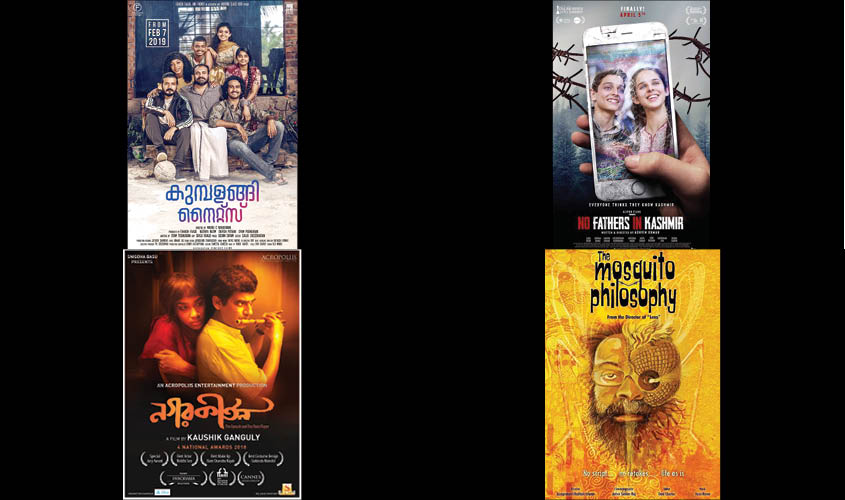The 14th edition of the Habitat Film Festival (HFF)—hosted at Delhi’s India Habitat Centre—opened this Friday, with the Oscar-nominated director Ashvin Kumar’s much-talked-about recent film, No Fathers in Kashmir.
Known for its film selection jury that emphasises quality and originality, the HFF is now ranked among the most awaited annual film events in the city. The current edition, which ends on 26 May, brings a pan-Indian selection of movies to the audiences, with the added bonus of insightful post-screening interactions with directors.
The 10-day festival is an initiative of the Habitat Film Club, which was founded in March 2000, with an aim to treat film buffs with a rich fare of meaningful and entertaining cinema from across the world, and to create an interactive forum where filmmakers can exchange ideas with critics and enthusiasts.
Filmmakers Sanal Kumar Sasidharan, Indraadeep Dasgupta, Ridham Janve, Joshy Mathew, Jubith Namradath, Jayaprakash Radhakrishnan, Kamakhya Narayan Singh, Wanphrang K. Diengdoh, Shareef Easa, Ranjan Ghosh, Priya Krishnaswamy, Vandana Kataria and others are among those expected to attend the festival this month. Bengali actress Rituparna Sengupta (who features in Ahaa Re) and Malayalam actress Rima Kallingal (Aabhasam) are also listed among HFF 2019 participants.
The HFF is nothing short of a cinematic treat for movie enthusiasts and young filmmakers, with its special screenings, debuts and master classes. It will showcase in its feature-films section 42 films in more than 19 languages, including Marathi, Bengali, Malayalam, Hindi, Kashmiri, English, Telugu, Haryanvi, Punjabi, Assamese, Kannada, Khasi, Gaddi, Ravula, Garo, Sherdukpen, Ladakhi Kumaoni and Santhali. An additional 45 critically acclaimed films will be screened under the event’s documentaries, shorts and student film segments.
Other films to be screened here are Vaada Chennai, Kumbalangi Nights, Nagarkirtan, The Mosquito Philosophy, Mehsampur, Noblemen, Tarikh, The Gold Laden Sheep and the Sacred Mountain, Jonaki, Lorni: The Flaneur, Baaram, Abhyakto and Death of an Insane among many more. The screenings will be followed by interactive sessions with the respective directors.
Apart from the screenings, the master classes by filmmakers and relevant panel discussions scheduled to be held here will be a great draw for visitors.
The HFF is an attempt on the part of its organisers to draw attention away from the mainstream of Indian cinema to its margins. In keeping with that philosophy, the films listed for screening at HFF 2019 form a unique sampling of substantive and socially-engaged cinema made in this country in recent months.
On its final day, for instance, the festival will host a screening of Devashish Makhija’s 2018 film, Bhonsle. The film is about the flare-up between local Maharashtrian fanatics and migrant Biharis in Mumbai. The screening of the Malayalam film Aabhasam will be followed by a panel discussion on the #MeToo movement and the formation of the Women in Cinema Collective (WCC) in the Malayalam film industry. The discussion will feature actress Rima Kallingal, director Jubith Namradath and will be moderated by film critic Anna M.M. Vetticad. A dedicated festival lounge has been kept in place for in-depth interactions between filmmakers and film scholars.
The festival has grown to accommodate an exciting portion of short films and student films in addition to the documentaries. A special package of documentaries on Dadasaheb Phalke awardees, directed by Savita Oberoi, will also be screened. A highlight of PSBT (Public Service Broadcasting Trust) films in the documentary segment is Prantik Basu’s Rang Maha, which was also selected in the International Competition Berlinale Shorts section at the 69th Berlin International Film Festival.
Several outstanding student films, including The Firefox Guardian, Glow Worm in a Jungle, Khela, What is the Colour of the Colourless Sky and many more, are also lined up for screening here. In this new “Student’s Cinema” segment of the festival, several
Vidyun Singh, programmes director, India Habitat Centre, said, “Habitat Film Festival is known for its diverse choice of films. For the last 14 years, it has been providing the best of all worlds and has been showcasing films that have deeply engaged the audiences with its social and local contexts, displaying fine sensibilities and sensitivities. This is a selection that affirms our heterogeneous character. Film has always been a strong medium for the community to come together and we are thrilled to present the best of Indian cinema once again.”
All films at the festival will be shown with English subtitles. The entry to the screenings is free but requires prior registration. Passes can also be picked up from the Programmes Desk, IHC.

